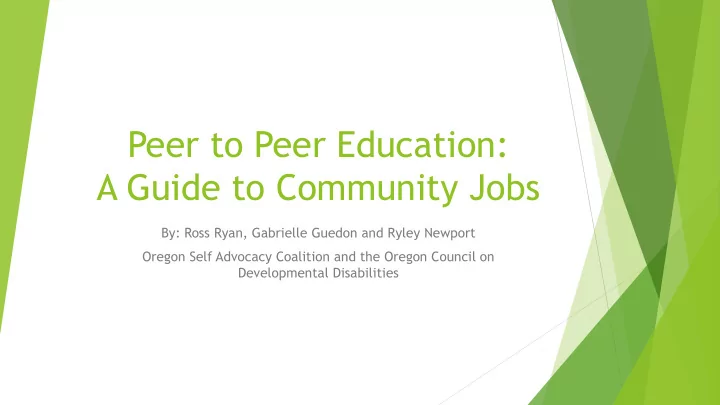

Peer to Peer Education: A Guide to Community Jobs By: Ross Ryan, Gabrielle Guedon and Ryley Newport Oregon Self Advocacy Coalition and the Oregon Council on Developmental Disabilities
Who are we? Gabrielle Guedon Ryley Newport Ross Ryan
Main Points Explain OSAC's role in improving work opportunities for people with disabilities. Provide details of Oregon's new peer-to-peer education project. Share examples and resources to make this a possibility in your own community!
What is OSAC? What is the Oregon Self Advocacy Coalition? What are OSAC's goals? How do we feel about isolation and segregation? What are OSAC's feelings on sheltered workshops? How do we feel about subminimum wages?
What is OSAC’s role in expanding employment opportunities? The Oregon Self Advocacy Coalition (OSAC) believes that all people with intellectual and developmental disabilities should have living wage jobs in their communities.
Oregon’s Employment Services Oregon has taken proactive steps to change employment services and move away from sheltered workshop placements. However, much still needs to be done. 2,010 individuals with disabilities are in sheltered workshops. $4.18 per hour average hourly pay for those in sheltered workshops. Sources: Oregon Employment First Data Report February 2016
Lane v. Brown: What does this mean for Oregonians with disabilities? By June 30, 2017, Oregon will reduce the number of individuals with I/DD in sheltered workshops from approximately 1,925 to 1,530 The state will ensure that 1,115 working-age individuals currently in sheltered workshops obtain competitive integrated employment by June 30, 2022 By July 1, 2022, Oregon will ensure that at least 4,900 people between the ages of 14 and 24 receive state employment services and at least half will receive, at a minimum, an individualized employment plan through OVRS that should lead to competitive employment The State will establish a goal that individuals with I/DD who receive supported employment services under the Agreement work in an integrated employment setting at least 20 hours per week Source https://droregon.org/lane-settlement-agreement/
Why is this important? Oregon’s employment services are changing but many families and people who receive services don’t understand the changes. Peers provide each other with skills and information to be successful. Research shows that peer education produces changes in knowledge, attitudes, behaviors and personal outcomes.
Our experiences in sheltered workshops… Have you worked in a sheltered workshop? What was it like to work in a sheltered workshop? Why did you leave the sheltered workshop? What do you do now?
How could peer mentors have helped? How could a peer mentor have helped you in moving into working in the community? Why do you think it's important for people with disabilities to help mentor their peers? How do you see this peer education project helping others in Oregon?
What makes a good peer educator? What skills does a peer educator need? What work experiences does a peer educator need? What should the outcome be of working with a peer educator?
OSAC Employment Resources
OSAC’s Suggestions for Finding a Job!
OSAC Employment Resources
Details of P2P Project: How does this look in Oregon? Advisory Committee Provides guidance and includes OSAC, VR, OR APSE, DHS and WISE Hire Consultants We have hired Tara Asai, Debra McLean and JoAnn Sowers to develop curriculums for educators and for job seekers and to hold trainings Train the Trainers Recruit peer educators, develop marketing materials and hire peer educators
Common and questions and concerns about P2P My child is too disabled to work You don’t understand my child, I understand my children How do we have transportation as a peer educator? What if individuals in the sheltered workshops are upset about what we’re talking about during an employment training?
Thank You! Contact information: Gabrielle Guedon, marieguedon89@yahoo.com Ross Ryan, (503) 910-4864, ross.s.ryan5@gmail.com Ryley Newport, (503) 949-7203, ryley.newport@ocdd.org Learn more at askOSAC.org!
Recommend
More recommend